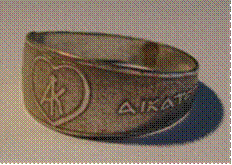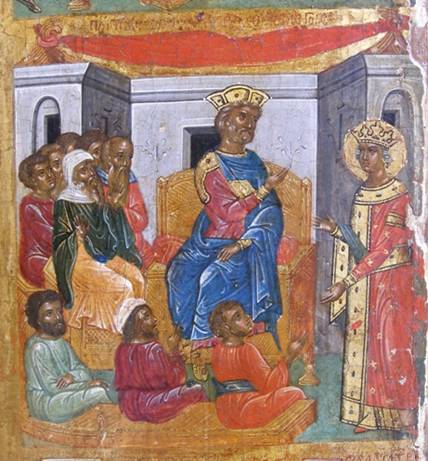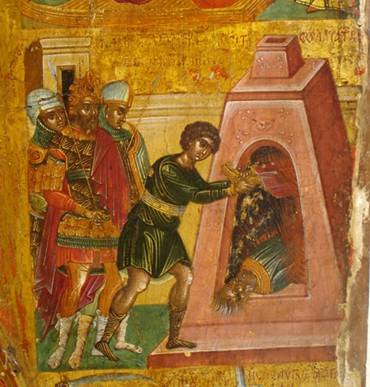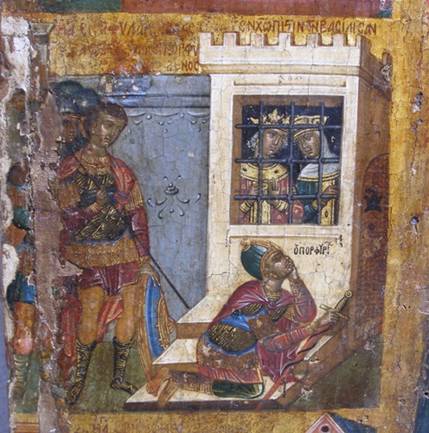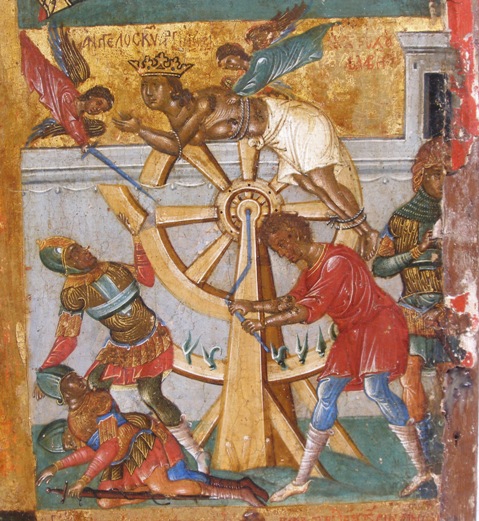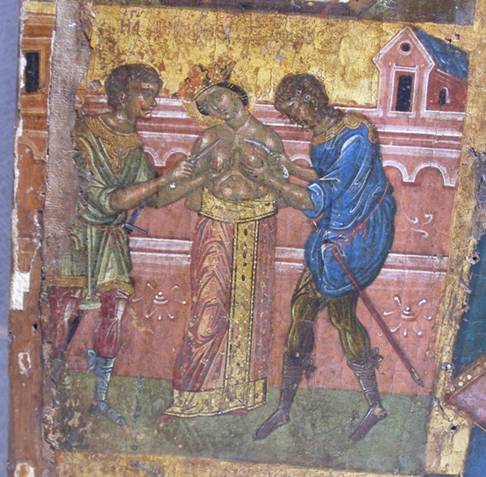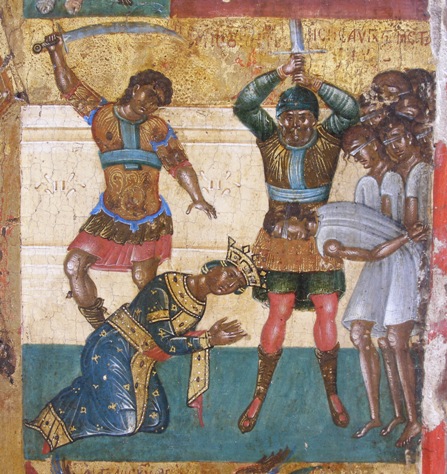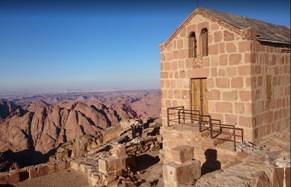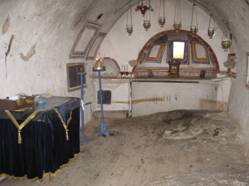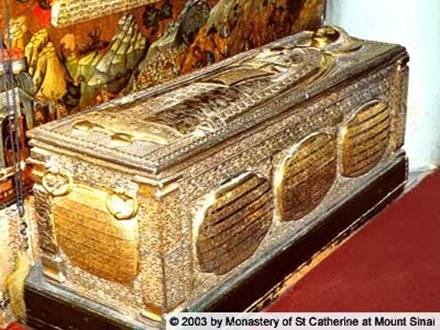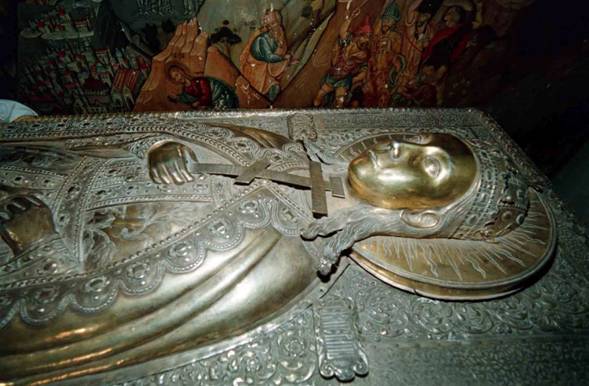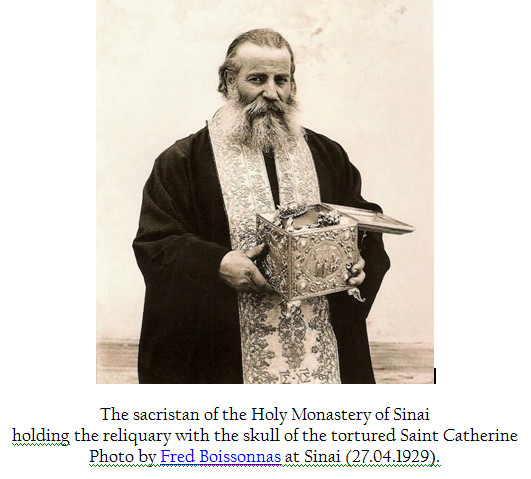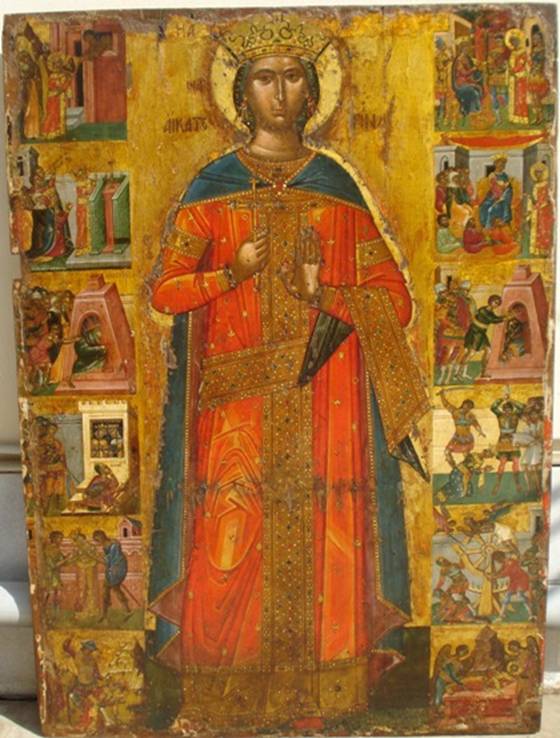|
|
Orthodox Outlet for Dogmatic Enquiries | Essays on Orthodoxy |
|
The life of Saint Ekaterina of Alexandria Holy Virgin and Great-Martyr Commemorated on the 25th of November Source: "The Synaxarion" by Saint Nicodemos of the Holy Mountain |
|
Ekaterina, the glorious Great-Martyr of Christ, was from the renowned city of Alexandria in Egypt. She was martyred during the time of the irreverent kings Maximian, Maxentius and Maximinus, who reigned between 305-313 A.D.. Her Life and her Martyrdom are so wondrous and so fascinating, that every soul who carefully reads and hears about them is amazed and spiritually renewed, also harvesting many spiritual fruits.
This blessed girl was the daughter of Konstas (or Kestus),
former king of Alexandria. She was exceptionally beautiful, and
had received the best of Hellenic education. She had learnt all
the major poets and philosophers, as well as everything written
by the renowned physicians Asclepius, Hippocrates and Galen, and
also had a profound knowledge of Rhetoric and Logic, as well as
other languages, thus becoming admired for her wisdom by all
those who had met her, and amazing even those who had only heard
of her. Many very wealthy nobles of the Senate sought to marry
her asking for permission from her mother, who however was
secretly a Christian because of the large-scale persecution of
the faithful that Maximian had launched.
Ekaterina’s relatives and her mother advised her to marry
so that her father’s estate would not be claimed by a foreigner
husband, as that would also alienate her from her family
altogether. Being a
philosopher, Ekaterina greatly loved chastity and virginity, so,
by giving various excuses, she would say that she did not want
to marry at all.
But when she saw that the suitors had become a nuisance, she
purposely told them that she would choose a husband, only if he
was worthier and more gifted than herself – in appearance, in
education, nobility and good manners. Those who persisted, she
rejected by simply telling them that they didn’t have all the
qualifications that she required.
Now her mother had a very holy spiritual guide who lived in
hiding, outside the city. So she took Ekaterina and went to that
Elder for advice.
Upon noticing her proper behaviour and hearing her knowledgeable
and careful opinions, the Elder set his mind on guiding her to
the knowledge of Christ, the Heavenly King, so he said to her:
“I know of a wonderful man, who incomparably surpasses you in
all the charismas that you mentioned, and many more.
His beauty is far brighter than the sun, His wisdom
governs all created things, both visible and invisible, and his
treasures are distributed to the whole world and they never
diminish, but instead they increase as they are distributed. His
noble character is furthermore inexpressible, incomparable and
inconceivable.”
After hearing these things and more by the Elder, the blessed
girl imagined that he was telling her of a terrestrial man, and
she immediately felt a change in her heart, so she asked the
Elder if all those praises were true. He then outlined who
Christ was, and also told her that His Mother was a Most Holy
Virgin, who became immortal thanks to Her exceptional sanctity.
Ekaterina was intrigued, and asked the Elder if she could see
that man for herself.
The Elder replied that if she truly wanted to meet Him in
person, she had to obey the Elder’s instructions.
She sensed he was sincere and truthful, so she agreed to
do what he told her.
He then gave her an Icon of the Holy Mother with the
child Jesus in Her embrace, and advised her to pray privately in
her room, asking the Holy Mother to allow her to meet Her Son.
Ekaterina receiving the Icon of Christ and His Holy Mother from
the Elder
She followed the Elder’s instruction, and, after having fasted
and prayed with tears for a long time in her room, she again
fell asleep with exhaustion, and the Heavenly Mother again
appeared, like She did the first time, in a vision. But this
time, the Holy Child looked directly at the virgin Ekaterina,
His face now radiant with joy. When the Holy Mother asked Him
how Ekaterina appeared to Him now, He said that she now looked
much brighter and glorious, compared to her previous appearance.
He also reassured Ekaterina that she was now truly much
wealthier and wiser, and gifted even more than before.
His words were so imposing and magnificent, that she
began to weep, insisting that she was not worthy to even look
upon Him, but only asked Him to make her worthy of being one of
His servants. The
Holy Mother then took Ekaterina’s hand and brought it towards
Her Son, saying: “Give her the ring of betrothal, so that she
can be Your bride in Your Kingdom”.
Christ then placed a beautiful ring on her finger, and
said to her: “Behold, today I am receiving you as my
incorrupt and eternal bride; for this, you will respect the
agreement to not make any terrestrial man whatsoever your
husband.” When Ekaterina woke up from that vision, she
discovered that on her finger was indeed the ring that Christ
had placed there! From that moment on, her heart was captivated
by a divine love for her Lord, Jesus Christ.
Christ placing the ring of betrothal on Ekaterina’s finger
After this decree had reached every corner of the land, a great
multitude gathered in the city, bringing whatever each person
could – the rich brought oxen or sheep, while the poor brought
birds and other, smaller offerings. When the day arrived for
that despicable festival, the irreverent king sacrificed 130
bulls, while the other nobles and lords sacrificed fewer, so
that each and every pilgrim had shown their gratitude towards
the king, as well as towards those unholy “gods”.
The air soon became unbearable because of the cries of
the animals being slaughtered and by the thick, heavy smoke that
rose from the burning offerings, so that there was great
confusion and frenzy everywhere.
On seeing the deplorable state that the people had descended
into, as they rushed towards such impiety in the vain hope of
temporarily escaping death by betraying their souls for all
eternity, the grace-filled Ekaterina became heartbroken. She was
filled with compassion for them, and was suddenly overcome with
divine zeal. So she went to the temple where the mindless people
were attending the sacrifices. When she arrived at the door of
the temple, all eyes were attracted to her beautiful appearance.
She then notified the doorman that she wanted to speak to the
king about something very important, and the king said that she
could enter. As soon as she approached him and bowed before him
out of courtesy, she immediately began to berate him:
“You, my king, should have been the first to realize what
kind of delusion you have all fallen into, by worshipping idols
that are perishable and unfeeling; It is a great shame, to be so
obviously blind to the truth, by foolishly worshipping such
abominations! At least you should have heeded the words of your
wise men, who told you that these statues are not real gods, so
that you could avoid eternal damnation! The true God is only
One, Who is Pre-Eternal, without a beginning, Who is Immortal,
and Who eventually took on the form of a human for the salvation
of all mankind! He
created everything by His command, and He also preserves
everything, so He has no need for such bloody sacrifices, nor is
He pleased with the slaughter of so many innocent animals, which
are not to blame. All He wants of mankind is to respect His
commandments.”
The king was greatly angered on hearing such accusations and
remained speechless for a long time. Not able to respond to her
words, he replied:
“Let us finish the sacrifices, and we can listen to you more
carefully afterwards.”
After completing that abhorrent festival, he gave orders
for Ekaterina to be brought before his throne and he asked her:
“Who do you think you are, and what are the reasons you said
what you did?” She replied:
“I am Ekaterina, I am well educated in all the
sciences and languages; but I have scorned all of them, and I
intend to become the bride of the Lord Jesus Christ, Who said
the following words, through the mouth of His Prophet: ‘I
shall destroy the wisdom of the wise and I shall violate the
prudence of the prudent’.”
(Isa.29:14). Admiring
her wisdom and beholding such beauty, the king imagined that she
was not born of earthly parents, but was possibly one of those
“goddesses” that he revered, which had now appeared before him
in human form.
Ekaterina accusing the king that he was worshipping demons
The king interrupted that argument, on the pretense that a king
should not converse with women; instead, he arranged to gather
the wisest of his orators, who would convince her with their
eloquence to understand the errors of her belief and return to
the worship of the idols. That being said, he gave orders for
Ekaterina to be guarded carefully, while he sent letters to all
the cities under his jurisdiction, with the following content:
“I, your king, send greetings to all the wise men and
orators of the Hellenes, and I ask you to come to me speedily,
so that we may invoke the most wise god Hermes (“Mercury”)
and with your excellent knowledge, quash the boldness of a
very knowledgeable female, who appeared here recently and mocked
the great gods, calling their acts “myths” and “prattlings”. In
doing this, you will be displaying your traditional wisdom
before her, you will be greatly admired by the people, and you
will be richly rewarded by me.”
A sizeable number of orators eventually responded to the king’s
invitation – one hundred and fifty of the best and the most
expert in speeches.
The king warned them in advance to be well prepared to confront
Ekaterina as a brave warrior and a strong orator, and to not
feel over-confident that they would be competing against a mere
woman. One orator then began to boast that no-one could possibly
defeat them, not realizing that they were all going to confront
a Grace-filled servant of God with their foul and offensive
tongues. So the
king convened them all in the amphitheater, with a multitude of
civilians looking on, to see the outcome.
But, just before she was taken to the amphitheater, the
Archangel Michael descended from Heaven and said to her: “O
hand-maiden of God, do not be afraid! Because – behold – the
Lord will give you additional wisdom above your own, and you
will defeat the 150 orators.
Not only will they believe in the things you will say,
but many others will also believe, through you, and you will all
receive the crowns of Martyrdom from God.”
The envoys went and brought Ekaterina to the amphitheater, and
immediately she was confronted there by that boastful orator,
who questioned her in a severe tone of voice: “Are you
the one who brazenly insults our gods so shamelessly?”
But she replied in a very gentle voice: “I am the one;
however, I spoke thus, without shame - as you said - or
brazenness, but instead, directly and in fact, truthfully.”
The orator said: “But when poets call them ‘supreme’, you –
who have tested their wisdom and have savoured so much pleasure
from them – now dare to wag your tongue against them with such
brazenness?”
The argument continued along those lines – with the orators
quoting flattering terms about their gods, while pointing out
that those poets never mentioned her God anywhere.
But Ekaterina counter-quoted verses of those same poets,
who, although they had used various adjectives and titles for
those “gods”, they had nowhere actually referred to them as
gods. Furthermore, she reminded the orators of all the unsavory
characteristics of those gods’ behaviors: cheating, lechery,
promiscuity, revenge, coveting, murders...
As for the true God not being acknowledged by their
famous poets, she reminded them of the prediction of their own,
wise oracle Sibylla, who had actually foretold the Incarnation
of Christ, as well as the betrayal and His Crucifixion...
Ekaterina challenging the orators that were summoned by the king
The orators publicly executed in the burning furnace on the 17th
of November
The king became increasingly worried about Ekaterina’s decision,
and, after being defeated by her wisdom, tried to persuade her
to return to the worship of the traditional “great gods” –
especially Hermes (Mercury), who had supposedly given her the
gift of wisdom and philosophical knowledge. If she obeyed, the
king promised he would give her half of his regal authority, and
that she would reign together with him.
But she immediately saw through his intentions, and once
again berated him for his hypocrisy and his persistence in
worshipping demonic idols, and reminded him that she was a
Christian already betrothed to become a bride of Christ, and
that she had decided to remain a virgin for His namesake, even
at the price of torture.
The king then resorted to threats against her, but Ekaterina
replied that her martyrdom would only bring more people to the
faith; however this aggravated the king even more.
He gave orders for her to be stripped of her royal robes
and be whipped relentlessly. For more than two hours she was
beaten and whipped all over her body, with her blood painting
the ground red beneath her, but she remained so unflinching,
that the onlookers were amazed at her bravery.
The same evening, that monster gave the command for her
to be locked in prison, without food or drink for twelve days,
to make her see what kind of torture she would be facing.
Faustina, the king’s wife, had a fervent desire to meet the
Saint in person, because she had come to love her after learning
about her virtues and her accomplishments. But she was also
prompted to meet her because of a dream she had about the Saint.
One day, when the king had decided to leave his city for a few
days and go to the countryside, Faustina decided to visit the
Saint, accompanied by a very important noble - a faithful and
trusted friend of the king, by the name of Porphyrion.
To him, Faustina disclosed the dream she had seen:
“Last night, I saw Ekaterina in a vision, seated in
the midst of many young and beautiful virgins, dressed in a
white gown, and her face emanated such a brilliant light, that
it was impossible to look directly at her. However, she
approached me, placed a gold crown on my head and said that the
Lord Jesus Christ sends me that crown. I need to see her so
urgently, that I cannot rest. So, please make the necessary
arrangements for me to see her.”
Faithful Porphyrion reassured her that he would help
her.
At nightfall, Porphyrion took 200 soldiers with him and
accompanied the queen to the prison. He had also taken money
with him, to bribe the jailer to open the prison doors.
But when the cell door was opened, and the august queen
saw the face that she desired so much, glowing with a divine
light, she fell at the Saint’s feet with tears, saying: “Now
I can consider myself a truly fortunate and blessed queen,
because I have seen your royal and divine person, and I will not
regret it, even if it costs me my life.”
The Saint reassured her, saying: “You too are blessed,
my queen, because I can see the Holy Angels placing a gold crown
on your head, which you will receive after three days, when you
will have shown patience during the punishments that await you
briefly. Thereafter, you will be with the Lord, forever.”
Porphyrion and his soldiers take the queen to see Ekaterina in
prison
In the meantime, the Lord, as a caring Father, did not abandon
Ekaterina in that terrible situation for so many days, but sent
some food to her with a dove, every day.
That same caring Father visited her Himself in all His
glory and accompanied by hosts of His Angels, in order to
strengthen her resolve even more, by saying to her: “Do not
be fainthearted, my beloved daughter, as I am with you. No
torture will affect you. Rather, because of your patience, you
will bring back many souls to Me, and you will deserve many
crowns and trophies.”
These were the Lord’s words to Ekaterina on her last night. The
next morning, the king commanded that Ekaterina be brought
before him. How great was his surprise, as well as the others
present, when they saw the Saint so radiant and beautiful
entering the room! The king immediately thought that one of the
guards must have been giving her food secretly, which was why
she had not become emaciated from hunger and thirst after so
many days, nor had lost any of her beauty, so he decided to
punish the guards. To prevent them from being punished unjustly,
Ekaterina told the king the truth about her stay in prison –
that Christ Himself, Who cares for all His faithful servants –
had been miraculously sending her nourishment. But the king
decided to test her once again, after seeing such perfect
beauty, using flattery and treachery and promising her that a
person such as she deserved to rule the kingdom.
If she agreed to sacrifice to the traditional “gods”, she
would become queen and live a life of luxury; furthermore, that
it would be a shame for such beauty to go to waste.
The Saint’s response was:
“I am only earth and clay; every kind of beauty
withers and disappears like a dream – either due to a sickness
or old age – or eventually, with death. So, you need not concern
yourself about my beauty.”
While this conversation was taking place, a certain Eparch of
the kingdom, Hursasadan by name, who was a very vicious
character and crafty, thought of something to gain the king’s
favour. He told the
king of a special instrument of torture that would either defeat
the Saint, or at least cause her a very painful death.
So he gave instructions for building a four-wheel
structure on a common axis and a platform, and embedded on the
outside rim of each wheel various metal objects such as pointed
iron blades. Each pair of wheels would be turned in opposite
directions, with the body of the victim laid out between them,
so that the victim’s flesh would gradually be torn into pieces
by the rotated wheels. The king approved of the idea and
expected Ekaterina to change her mind when realizing what kind
of torture she was going to undergo.
The lethal machine was ready in three days. The Saint was
brought before it, and the executioners began to turn the wheels
with force, hoping to scare her into changing her mind. The king
now also threatened her with that horrific torture if she didn’t
choose to repent, but she remained steadfast and indifferent to
his threats of an excruciating death. However, the Grace of God
did not abandon her. When they tied her down between the wheels,
her bonds were miraculously loosened by an Angel sent down by
God, and she herself was freed and untouched. As for the
machine, the wheels began to spin wildly out of control and its
smashed components were scattered in all directions, killing
many of the irreverent bystanders who had come to “enjoy” the
bloody execution.
On learning what had taken place, the queen came out of her room
and berated the king in front of everyone, telling him how
foolish he was, by persistently trying to fight against the
living God and torturing His chosen servant so unjustly.
Surprised by this unexpected attack by his wife, he
turned away momentarily from Ekaterina and in total disregard of
his conjugal relationship with the queen he commanded that her
breasts be cut off with special instruments of torture. But she
only rejoiced, being certain that she would be accepted in
Heaven through her martyrdom. Onlookers pitied her terrible
suffering, as they watched her blood streaming to the ground,
but the king did not feel any pity for her; instead, in his
crazed fury he gave the command for decapitation. In her last
moments of suffering, the queen asked Ekaterina to pray for her.
She consoled her, assuring her that Christ would be welcoming
her in His kingdom very soon.
She was decapitated on the 23rd of November.
Later that night, Porphyrion went with some trusted
soldiers and took her sainted body and gave it a proper burial.
The king’s wife, Faustina, tortured by having her breasts cut
off.
Beheading the queen and the accompanying soldiers
Moments before her execution, the holy Martyr offered a fervent
prayer to her Lord, Jesus Christ, thanking Him for the patience
He had given her, and the guidance she had received to find Him.
She asked for forgiveness for herself and for those who did not
know what they were doing, and finally, she asked Him to ensure
that her sacrificed body would be made invisible to those who
would want to abuse it, and instead, keep it intact and safe,
wherever He saw fit to place it. She also prayed that the Lord
will grant the wishes of all those who ask for them, in her
name.
Angels carrying off the sacrificed body of Ekaterina
Saint Catherine’s Peak on Mount Sinai with the chapel built on
the spot that her body was found
Exterior and interior of the chapel of Saint Catherine on the
peak of Mt. Sinai
Larnax (reliquary) holding Saint Catherine’s body
Closeup with details of larnax
Imposing view of Mount Sinai peaks
************
On the 25th of November, also commemorated by the
Orthodox Church are the 150 repentant orators who were executed
by fire, as well as the queen, who was beheaded for her faith in
Christ, and the king’s friend and army commander, Porphyrion,
together with his 200 soldiers, who were also beheaded for
confessing their faith in Christ.
Source of Icons :
//panagia-ierosolymitissa.blogspot.com/2016/11/blog-post_25.html
|




